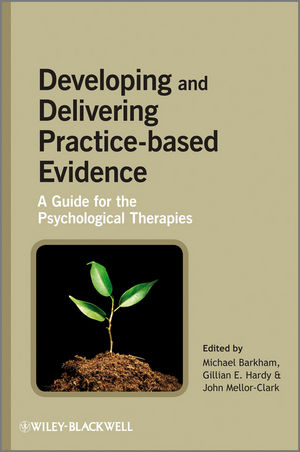Developing and Delivering Practice-Based Evidence: A Guide for the Psychological TherapiesISBN: 978-0-470-03234-3
Hardcover
408 pages
March 2010, Wiley-Blackwell
 This is a Print-on-Demand title. It will be printed specifically to fill your order. Please allow an additional 15-20 days delivery time. The book is not returnable.
|
||||||
—Marvin R. Goldfried, PhD, ABPP, Distinguished Professor of Psychology, Stony Brook University, USA
"We are now familiar with evidence based practice that has
powerfully influenced service provision in the psychological
therapies. As practitioners however, we are acutely aware of
its limitations. Research that informs the evidence base we are
routinely referred to is distant and remote from our experience. It
feels disempowering as our every day practice is influenced by
randomised controlled trials that espouse a medical model that does
not reflect the diversity and complexity of practice as
counsellors, psychotherapists and psychologist know it. We
are acutely aware that clients with a single diagnosis are rare and
that our clients come in unique packages that could never be
captured in a meaningful group that could reliably be randomised
for trial purposes. Practitioners have been marginalised and
disempowered by current research paradigms and it is time for a
change.
This book provides just the change in emphasis that we are looking
for and indeed hungry for. It provides a comprehensive account of
everything a practitioner needs to know about the generation of
practice based evidence. It is just the book that is needed
to inspire practitioners to engage with research through meeting
with others in practitioner networks or influencing the agencies
they work in, to start collecting data. A ground swell of
researcher practitioners engaging in meaningful research with their
own clients or agencies can influence theory and practice for the
future. Indeed practice based evidence could become the new
evidence based practice.
Many advocates of practitioner research, who have themselves
already made substantial contributions to theory and practice
through the development of theories, instruments and systems have
contributed to this book. Indeed, it is a potentially historical
text that captures in one volume the assembled knowledge of the
vanguard who will lead essential changes in the way that knowledge
is generated in the field of psychotherapy. It has the potential to
be revolutionary as it becomes a recommended text for psychotherapy
researchers and practitioners that will herald a shift in how
research is conducted, who does it, how it is reported and the
influence it will have on future services."
—Professor Sue Wheeler, Director of Counselling and
Psychotherapy Programme, University of Leicester, UK
It is a potentially historical text that captures in one volume
the assembled knowledge of the vanguard who will lead essential
changes in the way that knowledge is generated in the field of
psychotherapy. It has the potential to be revolutionary as it
becomes a recommended text for psychotherapy researchers and
practitioners that will herald a shift in how research is
conducted, who does it, how it is reported and the influence it
will have on future services."
—Professor Sue Wheeler, Director of Counselling and
Psychotherapy Programme, University of Leicester, UK
"The field of psychotherapy has witnessed an increasing emphasis
on the need for research evidence that can inform clinical
practice. As this volume most clearly illustrates, however, there
is also an important need for clinical practice to offer input on
the effectiveness of our treatments. More than just providing lip
service to closing the gap between research and practice, this
edited volume gives us specific suggestions and guidelines for how
this may be done. Indeed, it is a major contribution in our search
for therapy interventions that have both a firm grounding in
research evidence and converging support from clinical
reality."
—Marvin R. Goldfried, PhD, ABPP, Distinguished
Professor of Psychology, Stony Brook University, USA



